HIT CHANNEL EXCLUSIVE INTERVIEW: January 2020. We had the great honour to talk with a legendary musician: John Greaves. He is best known as the bass player of avante-garde rock heroes, Henry Cow and has also been a member of National Health, Soft Heap and The Lodge. He has worked on several occasions with Peter Blegvad (including 1977’s iconic “Kew. Rhone.” album with Lisa Herman) and has also collaborated with Robert Wyatt, Nick Mason, Jack Bruce, Michael Mantler, Sophia Domancich and many others. In 2019, he released “Folly Bololey” (Dark Companion Records) along with North Sea Radio Orchestra and Annie Barbazza, re-working Robert Wyatt’s songs (mostly) from “Rock Bottom” album. His latest solo album, “Life Size” released in 2018 from Manticore Records. Read below the very interesting things he told us:
 Let’s start with “Folly Bololey” album. How did you come up with the idea to revisit Robert Wyatt’s “Rock Bottom” (1974) album?
Let’s start with “Folly Bololey” album. How did you come up with the idea to revisit Robert Wyatt’s “Rock Bottom” (1974) album?
OK. Here it goes: The truth is it wasn’t my idea at all. I did that for fun, later. The potential of the album was about a big festival in Lyon, Les Nuits de Fourvière by a certain Mr. Richard Robert, who asked us on the 40th anniversary (ed: 2014) of the release of “Rock Bottom”. He asked me, Élise Caron and Silvain Vanot to think “Rock Bottom” as a celebration. But he asked me that we must do it with the North Sea Radio Orchestra, who I didn’t know at the time. When I heard them, I thought: “This is perfect”. This is a perfect vehicle for this wonderful record and I am sure that Robert would be proud of it and I know that he is. That was 5 years ago. But now the “Folly Bololey” record came about when Max Marchini, an Italian record producer invited us to record it in Piacenza in Italy. We did one concert and we did record the rehearsals and that was produced in the Studio Elfo by Alberto Callegari and that became the record that is then called “Folly Bololey” and that answers your question.
What does Annie Barbazza’s voice bring in “Folly Bololey” album?
I think it brings a perfect new voice to it. Because Annie was part of the Italian production team and Annie is someone that I ‘ve known for several years. She has a perfect young voice for a record that was made a very long time before she was born. She knows that kind of music intimately and she sings it perfectly, as Robert Wyatt himself has said.
Would you agree that there is a Henry Cow flavour in the song “Alife” from “Folly Bololey”?
Henry Cow, do you mean when it gets rather free? No-one tried to reproduce “Rock Bottom” because it would have been impossible. What we wanted, especially me and Craig Fortnam (ed: North Sea Radio Orchestra mastermind) was our own interpretation to it, as for me and as for everyone on the record. I don’t do much on it. I am very proud to play a couple of Hugh Hopper (ed: Soft Machine bassist who played on “Rock Bottom”) bass lines which I loved playing and I do a Welsh version of Ivor Cutler (ed: Scottish poet and songwriter). “Alife”… I think your question is very accurate. I think I just get free and I let go, as we used to do in those days. It’s a moment of freedom, yes. I would say: “Yes” to your Henry Cow influence.
 Did you have fun playing the music of “Rock Bottom” live?
Did you have fun playing the music of “Rock Bottom” live?
Very much, so. I love this since the first time we did it, because we found a way to do it that has nothing to do with the way Robert did the record. Again, Craig Fortnam of the North Sea Radio Orchestra created the perfect vehicle to re-create that record which was very dear to me and dear to an awful lot of other people. What we did, it wasn’t trying to reproduce it, it was just giving another representation with the ultimate respect.
How difficult was it to get Fred Frith (Henry Cow – guitar) to join North Sea Radio Orchestra on viola on “Little Red Robin Hood Hit the Road” at Cafe Oto on 27 June 2019?
(Laughs) It was very easy. I have seen Fred about a week before, I think. I told him that we were doing the concert at Cafe Oto and he was playing at Cafe Oto the next night, so he was in London. He actually said: “Well, you can’t do it without me”.
How did you come in contact with Manticore Records for the release of “Life Size” (2018) album?
Max Marchini is a wonderful guy who lives in Piacenza, Italy who decided foolishly and hopefully about 5 years ago to form a label called Dark Companion and Max was in close contact with his dear friend, Greg Lake and Greg Lake delegated his label to Max. The label Manticore. It’s only the name; that all it is. So, Max is the producer of the album and we could have put out “Life Size” on Dark Companion rather than on Manticore, but I think Max was obvious to put it on Manticore. What do you think?
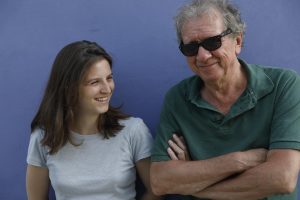 It’s nice to revive this old label.
It’s nice to revive this old label.
I hoped we would do what Greg Lake might want him to do. It’s not about old stuff, it’s about making new stuff possible which I think he (ed: Max Marchini) is doing. He’s got me and he’s got Annie Barbazza in new stuff.
“In Te” is a very addictive song and I think it should have been a huge radio hit! Did you realize when you recorded it that you created a catchy song?
It’s a very objective thing, because if it’s a great hit, I should be a very rich man, which I am not. Obviously, I don’t think that way. I recorded the album in Italy. I wanted to do an Italian song with the great Italian singer, Annie Barbazza. So, I had this song, I recorded it in French 25 years ago. I think you don’t know that. “Rose C’est La Vie” (1991). So, we translated it and interpreted it into Italian. It’s a very catchy song. I think it should be on all the radio, all over the world and there shouldn’t be anybody else to top it.
I like the music and your vocal performance in particular in “Still Life” from “Life Size” album. Is there any Scott Walker influence on this?
(Laughs) I think I answered your question before. No, it’s not. I haven’t been influenced by Scott Walker since the 1960’s when The Walker Brothers and The Righteous Brothers were playing pop music. I didn’t really follow his career later. I’ve been listening to him recently and I could see why people make that kind of comparison with him and I am very proud to accept that comparison.
“La Lune Blanche” is a very ethereal piece of music. Did you write it as a soundtrack for an imaginary film?
(Laughs) Like Frank Zappa, from example? No, I didn’t. There are very mad emotions on it. It’s a poem by French poet, Paul Verlaine. I composed it musically, I presented it. For making the vocals, I decided I wanted something different, so I exploded the chord structure and I made it possible just to reach the moon with it. That was my objective: To reach to moon. And the vocals by Himiko Paganotti made it possible.
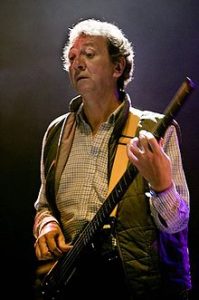 There are many guest musicians on “Life Size” album. What was your artistic intention by inviting all these people?
There are many guest musicians on “Life Size” album. What was your artistic intention by inviting all these people?
It’s a privilege of being the age I am -and because of the experience that I have had- that I have a lot of very-very talented people who would support me in what I do. I want to say this to you that I am fervently grateful to those people who made this album possible. We did it by email, actually. That’s true. People contributed from Los Angeles, Lyon, London, Paris, from Italy and I assembled it in Piacenza in Italy.
How did you get to record the song “Sonia” from Robert Wyatt’s “Ruth Is Stranger Than Richard” album (1975)?
Robert asked me. He asked me to play bass. He called me one night when I was living in London, an awfully long time ago. He was at some studio in London with Nick Mason (ed: Pink Floyd – drums). They were both there when he called me and asked me to come down and record two tracks, which I did. One of the songs was “Sonia” and the other was “Yesterday Man”, I think.
“Bad Alchemy” is my favourite Henry Cow song and also the first song you wrote with Peter Blegvad (Slapp Happy – guitar). Did you have Dagmar Krause’s voice in your mind when you wrote it?
That’s a very good question. (Pause) I think the answer is “No”. I didn’t know at that time who was going to sing it, unless you say that I had predicted it. Because I had written it before we started to record “Desperate Straights” (ed: recorded in November 1974) and that was when I knew it was possible to do it. No, I had written it before I knew Dagmar was really capable of doing it. I think this is the answer to your question.
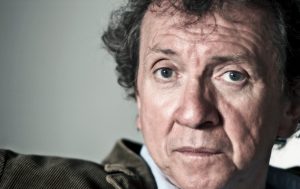 Yes. What did you have in mind when you wrote it?
Yes. What did you have in mind when you wrote it?
When I write a song, I don’t hear any member’s voice in mind. When I support songs or when I hear my songs sung by other people’s voice, it’s always great to hear them sound differently. I am doing several concerts in Paris at the moment where different voices are singing my songs and I am very-very proud of that. It’s beautiful to hear them sound differently.
What memories do you have of the Henry Cow tour with Captain Beefheart in May-June 1974?
I’m sure you’ve read a lot of stuff about that. So, I don’t know. What memories do I have? I remember seeing Don Van Vliet many years later in New York City. He saw me from across the street remembering who I was. He said: “Hey John!” and then we went to a great place. It was called Gramercy Park Hotel. These are my memories.
How emotional were the Henry Cow reunion concerts in 2014 as a tribute to Lindsay Cooper (bassoon, oboe)?
Emotionally it was enormous. It was huge. Very powerful to be there and especially for the tribute to Lindsay, whom I had known for such a long time. To me, reuniting on that day was phenomenal with so many people who were there to share that emotion. I don’t think it was a particularly great musical performance, but it doesn’t matter. The emotion was enormous.
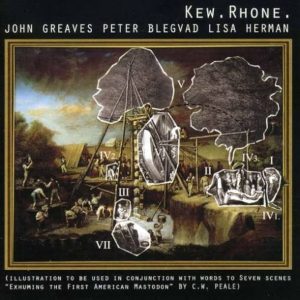 Describe to us the musical vision you and Peter Blegvad had when you recorded “Kew. Rhone.” (1977)?
Describe to us the musical vision you and Peter Blegvad had when you recorded “Kew. Rhone.” (1977)?
It was more than a musical vision. It was a phenomenological vision of how we wanted to base words on music in a… I have not been that articulate. I think it was a dadaist escapade. That’s what you can call it.
Were you surprised when you saw Charles Mingus in your studio during the “Kew. Rhone.” sessions?
How do you know that? Where did you see it? In the book (ed: “Kew. Rhone.” by Peter Blegvad, Uniformbooks, 2014). I was very surprised. It was one of the most extraordinary experiences of my life. You meet someone like Charles Mingus, that’s like meeting God. Which it was.
Was it a challenging experience to perform “Kew. Rhone.” in its entirety for the first time in France in 2008?
Again, I’m sorry to be coy but it’s always just a thrill. Maybe we will do it again in another 31-year span. We are all so young and beautiful.
Are you proud that “Kew. Rhone.” is considered as a cult album?
Yes. That’s my answer.
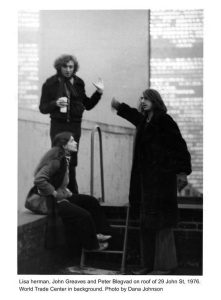 I truly love “Squarer for Maud” from National Health’s “Of Queues and Cures” album (1978) and Peter Blegvad’s spoken word part, in particular. Could you tell us a few words about this song?
I truly love “Squarer for Maud” from National Health’s “Of Queues and Cures” album (1978) and Peter Blegvad’s spoken word part, in particular. Could you tell us a few words about this song?
It’s called “Squarer for Maud” because Maud – you probably know this already- was a character in Peter Blegvad’s Amateur Magazine. Maud was a computer and a “squarer” was something that you had to buy to make your wife happy, but this doesn’t make her more happy. I told Peter: “I ‘m sorry, the guys are all tied up with the music, having written that piece with National Health, can you please record those verses with these unforgettable words?”, which Jonathan Coe always quotes as being his favourite: “Is it ‘numinousness’, ‘numinescence’ or ‘numinosity’?” When I met Jonathan Coe, the first words he said to me were: “Is it ‘numinousness’, ‘numinescence’ or ‘numinosity’?” That’s what he said. Again, it’s bringing words to music. It’s all about words and music. I am not ingested any kind of jazz rock songs. Dada comes back to it. It’s about the moment. Peter was there at the moment to record those two lines, which made the whole thing work. It makes the whole piece work.
Did you have a good time performing “The Collapso” with National Health on The Old Grey Whistle Test in 1979, when you threw a box of silverware on stage?
That was a great moment, yeah. That was my punk moment on British TV. At the time, in ‘79, we were in a jazz rock band which it seemed an outdated kind of music, two years after The Sex Pistols. I wondered what we were doing on British TV. Doing that moment it showed that we could be a punk band if we liked it.
Do you feel lucky that you got to meet Brian Epstein (The Beatles manager) and open for The Kinks at the Manchester University at an early age?
Yes, I am very lucky when I was born on the isle of consciousness and I certainly had a very lucky experience the time I was born. I lived with my parents and yes, that’s my life and I’m very lucky for being a musician since 1961 and playing music with a band in which all the people were very older. We were all lucky to be there.
Did you enjoy touring in 1986 with Michael Mantler and a spectacular line-up featuring Jack Bruce (Crea, – bass/vocals), Nick Mason (Pink Floyd -drums), Don Preston (Frank Zappa – keyboards) and Rick Fenn (10cc – guitar)?
Unfortunately, we didn’t tour with him. We just did one gig and it was great. I wish we could have done more.
What was it like to be with Jack Bruce on stage? I know that you admired him.
Very much. It was enormous. Enormous.
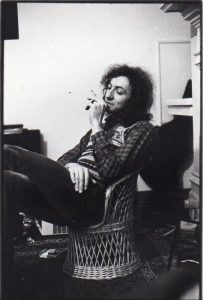 Did punk rock have anything to do with music or it was just a marketing invention? Chris Cutler (Henry Cow – drums) called punk rock groups like the Sex Pistols as “money hoovers”.
Did punk rock have anything to do with music or it was just a marketing invention? Chris Cutler (Henry Cow – drums) called punk rock groups like the Sex Pistols as “money hoovers”.
I don’t want to say that they were hypocrites. I know Chris has a very strong opinion about that. I think things need to be shaken up, all the time. I am very happy that The Sex Pistols came out, even though their music doesn’t mean anything to me. Neither did The Clash, actually. But it’s important to shake up things. I think a lot of things happened because of punk. It got rid of a lot of old stuff, like the old progressive rock groups. Probably not Henry Cow, because they were not in that time with the punk groups. It shook things up. You must always shake things up.
What is so special about Paul Verlaine (French poet)?
Nothing, except that he is a great poet and there are a lot of other poets. I love French poetry. I am a kind of expert in French poetry. I know a lot about it. What is special about him is that he is very easily sung. Paul Verlaine’s poetry fits with music. His poems are songs.
How much impact did The Beatles’ “Revolver” album have on you as a young musician?
Enormous. I have all their albums from the first one, “Please, Please Me” (1963), from the moment I knew them. I bought them the day they came out.
What is the meaning of Rock In Opposition in 2020?
I have no idea. It has nothing to do with what Chris Cutler formed in 1978. It has nothing to do with that. It has become another prog rock event, that I don’t understand. I don’t know what does “In Opposition” mean. They should always wear les Gilets jaunes (ed: the yellow jackets movement in France).
 What is worse for you: when people call you a progressive rock musician or an Englishman?
What is worse for you: when people call you a progressive rock musician or an Englishman?
Both are very insulting.
How exciting is it to do voice-overs for commercials?
I love it! I love it! I pretend that I am Richard Burton.
Have your ever worked on a commercial with Mike Ratledge (Soft Machine -keyboards)? I know that he has done thousands of them.
No, I haven’t. I don’t do what he does. I don’t do music for commercials. I use my voice. I become an actor, I become somebody else. I become what the story tells.
What is the secret of the lasting friendship and musical collaboration with Peter Blegvad (Slapp Happy – guitar)?
Pure love (laughs). Pure love and mutual and everlasting respect.
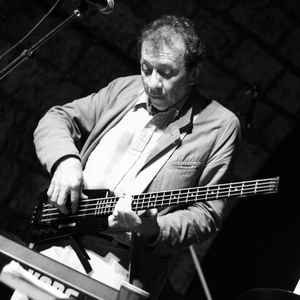 Why did you decide to move to France in 1984?
Why did you decide to move to France in 1984?
I didn’t decide to move here. I was here a lot. I have worked here a lot and I just decided not to go home. I found my musical joy. I have filed to get the French nationality and I ‘ll have it very soon. When you want to get the French citizenship, you have to have an interview. The morning I had the interview people asked me questions like: “Who is the President of France?”, “Who is the Prime Minister?” and everything else. And one of the questions was: “Why do you want to have the French citizenship?” and I replied: “I crossed Pont Neuf this morning and you look to the left and you look to the right and you don’t have to answer why do you want to live in Paris”. There is a good song I wrote which is called “The Same Thing” which is on “Life Size”.
Thank you very much! I wanted to do this interview for a long time.
We will play in Athens with Fred and Chris in May (ed: On 24 May 2020 at Underflow Record Store & Art Gallery).
A huge “THANK YOU” to Mr. John Greaves for his time. I would also like to thank Billy James and Max Marchini for their valuable help.
Official John Greaves website: https://www.johngreaves.org.uk/
Official Dark Companion Records website: https://www.darkcompanion.com/
Official Manticore Records website: https://www.manticorerecords.com/

